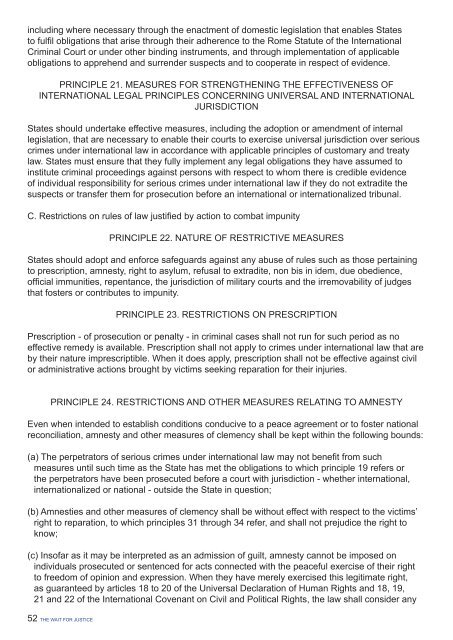The Commissioners of LLRC
The Commissioners of LLRC
The Commissioners of LLRC
You also want an ePaper? Increase the reach of your titles
YUMPU automatically turns print PDFs into web optimized ePapers that Google loves.
including where necessary through the enactment <strong>of</strong> domestic legislation that enables States<br />
to fulfil obligations that arise through their adherence to the Rome Statute <strong>of</strong> the International<br />
Criminal Court or under other binding instruments, and through implementation <strong>of</strong> applicable<br />
obligations to apprehend and surrender suspects and to cooperate in respect <strong>of</strong> evidence.<br />
PRINCIPLE 21. MEASURES FOR STRENGTHENING THE EFFECTIVENESS OF<br />
INTERNATIONAL LEGAL PRINCIPLES CONCERNING UNIVERSAL AND INTERNATIONAL<br />
JURISDICTION<br />
States should undertake effective measures, including the adoption or amendment <strong>of</strong> internal<br />
legislation, that are necessary to enable their courts to exercise universal jurisdiction over serious<br />
crimes under international law in accordance with applicable principles <strong>of</strong> customary and treaty<br />
law. States must ensure that they fully implement any legal obligations they have assumed to<br />
institute criminal proceedings against persons with respect to whom there is credible evidence<br />
<strong>of</strong> individual responsibility for serious crimes under international law if they do not extradite the<br />
suspects or transfer them for prosecution before an international or internationalized tribunal.<br />
C. Restrictions on rules <strong>of</strong> law justified by action to combat impunity<br />
52 THE WAIT FOR JUSTICE<br />
PRINCIPLE 22. NATURE OF RESTRICTIVE MEASURES<br />
States should adopt and enforce safeguards against any abuse <strong>of</strong> rules such as those pertaining<br />
to prescription, amnesty, right to asylum, refusal to extradite, non bis in idem, due obedience,<br />
<strong>of</strong>ficial immunities, repentance, the jurisdiction <strong>of</strong> military courts and the irremovability <strong>of</strong> judges<br />
that fosters or contributes to impunity.<br />
PRINCIPLE 23. RESTRICTIONS ON PRESCRIPTION<br />
Prescription - <strong>of</strong> prosecution or penalty - in criminal cases shall not run for such period as no<br />
effective remedy is available. Prescription shall not apply to crimes under international law that are<br />
by their nature imprescriptible. When it does apply, prescription shall not be effective against civil<br />
or administrative actions brought by victims seeking reparation for their injuries.<br />
PRINCIPLE 24. RESTRICTIONS AND OTHER MEASURES RELATING TO AMNESTY<br />
Even when intended to establish conditions conducive to a peace agreement or to foster national<br />
reconciliation, amnesty and other measures <strong>of</strong> clemency shall be kept within the following bounds:<br />
(a) <strong>The</strong> perpetrators <strong>of</strong> serious crimes under international law may not benefit from such<br />
measures until such time as the State has met the obligations to which principle 19 refers or<br />
the perpetrators have been prosecuted before a court with jurisdiction - whether international,<br />
internationalized or national - outside the State in question;<br />
(b) Amnesties and other measures <strong>of</strong> clemency shall be without effect with respect to the victims’<br />
right to reparation, to which principles 31 through 34 refer, and shall not prejudice the right to<br />
know;<br />
(c) Ins<strong>of</strong>ar as it may be interpreted as an admission <strong>of</strong> guilt, amnesty cannot be imposed on<br />
individuals prosecuted or sentenced for acts connected with the peaceful exercise <strong>of</strong> their right<br />
to freedom <strong>of</strong> opinion and expression. When they have merely exercised this legitimate right,<br />
as guaranteed by articles 18 to 20 <strong>of</strong> the Universal Declaration <strong>of</strong> Human Rights and 18, 19,<br />
21 and 22 <strong>of</strong> the International Covenant on Civil and Political Rights, the law shall consider any


